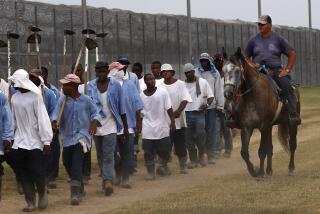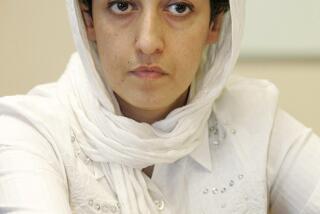S. Africa Rights Leader Joins Hunger Strikers
- Share via
JOHANNESBURG, South Africa — A hunger strike by about 235 South Africans held without charge under emergency regulations was joined Monday by a civil rights leader, the Rev. Allan Boesak, who predicted that the protest will have “fateful consequences for all of us in this country.”
“None of us wants to die,” Boesak, president of the World Reformed Council of Churches, said in an open letter to Minister of Law and Order Adriaan Vlok. “But if this is the road we must take to make you and your government understand the evil of your ways, we will take it.”
Vlok agreed to meet today in Cape Town with 43 lawyers representing about 100 of the hunger strikers. The lawyers fasted for two days last week to protest their inability, under the system, to challenge in court the detention of their clients.
Continual Review
Vlok, the country’s chief police official, said the meeting was part of his continual review of all detainees’ cases. He reiterated, however, that anti-apartheid activists held without charge will be freed only if the ministry determines that they no longer constitute a threat “to public safety and the maintenance of law and order.”
The fast, called to protest the government’s policy of detention without trial, has already gone on for three weeks for some of the detainees, and human rights groups say 14 people have been hospitalized. On Monday, the authorities took 10 more fasting prisoners to the hospital for treatment.
A few of those in the hospital are being fed intravenously, with their permission, and others have signed release forms allowing such feeding if doctors determine it is necessary to keep them alive.
The protest, the most widespread hunger strike in the country’s history, has presented a formidable challenge to the white minority-led government, which has detained an estimated 32,000 people for varying periods since its June, 1986, emergency decree. The emergency empowers the government to hold anyone it considers a threat to public safety for any length of time without filing charges.
About 1,000 people are being held without charge. Of these, about 200 have been held for more than two years.
The government has said it will not be “blackmailed” into releasing any political activists, and last week it banned all public gatherings designed to show solidarity with the striking detainees.
The police said they are investigating charges against newspapers for reporting on the hunger strike. Emergency regulations make it illegal to report on the conditions of detention.
One option for the government is to conditionally release the activists. About 500 detainees have been released in recent months under severe restrictions that, among other things, bar them from taking part in political activities.
The protest has spread to several prisons and police stations in Johannesburg and Port Elizabeth. Eleven detainees at a Port Elizabeth police station joined the strike Monday.
Taking Only Water
The strikers are refusing food, vitamins and medication, accepting only water supplemented by salt and sugar. Some detainees are said to have lost as much as 30 pounds, and one distraught mother who visited her son in prison Monday said he was so weak he had to be helped into the room.
Former detainees say the most frustrating and psychologically debilitating part of detention is not knowing when or if one will be released, and some people have suffered from severe depression.
Audrey Coleman, a human rights advocate who assists parents of detainees, described the strike as a cry for help.
She said: “They’re saying, ‘We’re dying in prison. We’re sealed away. People have forgotten us.’ ”
Boesak, in his letter to the government, said: “You have heard the detainees: Release us or charge us. That is the very least you could do.”
More to Read
Sign up for Essential California
The most important California stories and recommendations in your inbox every morning.
You may occasionally receive promotional content from the Los Angeles Times.














